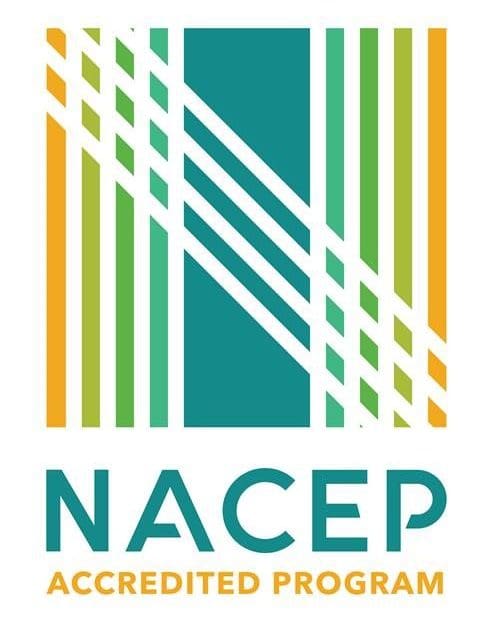NACEP Awards Accreditation to 19 Concurrent Enrollment Programs

NACEP Awards Accreditation to 19 Concurrent Enrollment Programs for Demonstrating High Quality and Rigorous Standards
Ten Programs Granted Initial Accreditation, Nine Reaffirm Program Excellence in College Courses Taught by High School Instructors
The National Alliance of Concurrent Enrollment Partnerships (NACEP) Accreditation Commission granted accreditation to 19 concurrent enrollment programs at colleges and universities nationwide. This brings the total number of accredited programs across the country to 116, spanning twenty-four states.
As the nation’s only accrediting body for these unique and impactful educational partnerships, NACEP’s standards serve as the model criteria for ensuring parity in faculty, course content, student outcomes, and support. Receiving NACEP accreditation means an institution has met the nation’s most rigorous standard in concurrent enrollment program development, management, and evaluation across multiple, multifaceted program areas. “NACEP accreditation demonstrates a commitment to academic integrity and the delivery of an authentic college experience to the high school student and is a goal that every concurrent enrollment program should aspire to and work towards,” said NACEP Executive Director, Amy Williams.
The programs that received accreditation meet established best practices in concurrent enrollment in the areas of curriculum, faculty, students, assessment, partnership, and program evaluation, “Congratulations to our newly accredited and re-accredited programs. The institutions being recognized have demonstrated adherence to high academic standards for their concurrent enrollment program and should be applauded for their commitment to quality programming” remarked Dr. Diana Johnson, NACEP Accreditation Commission Chair and Associate Vice President for Learning at NorthWest Arkansas Community College.
Two of this year’s applicants were the first institutions in their states to earn NACEP accreditation, South Texas College and Northern Virginia Community College. “South Texas College Dual Credit Programs is honored to be the first in the State of Texas to receive NACEP Accreditation. Throughout the past 20 years, our College has worked diligently to establish a well-developed Program that strives to form and maintain strong partnerships, create a collegegoing culture, and student success. The success of our Program has only been possible through the on-going support that has been received by the College’s Administration, Faculty and Staff and our 23 partnering School Districts,” stated Rebecca De Leon, South Texas College Dean for Dual Credit Programs & School District Partnerships.
To earn accreditation from NACEP, concurrent enrollment programs conduct a self-study, document how their programs adhere to NACEP’s sixteen standards, and undergo a rigorous peer-review process conducted by a team of representatives from NACEP‐accredited programs as well as the NACEP Accreditation Commission. NACEP’s accreditation is valid for five years for initial accreditation and then seven years for reaccreditation, during which time programs are expected to uphold NACEP’s standards and report annually on program practices.
Institutions Earning Initial Accreditation:
- Anoka Technical College (MN)
- Century College (MN)
- Farmingdale State College (NY)
- Fond du Lac Tribal and Community College (MN)
- Itasca Community College (MN)
- Minneapolis Community and Technical College (MN)
- Normandale Community College (MN)
- Northern Virginia Community College (VA)
- South Central College (MN)
- South Texas College (TX)
Institutions Earning Reaccreditation:
- Indian Hills Community College (IA)
- Minnesota State College Southeast (MN)
- Onondaga Community College (NY)
- Purdue University Northwest (IN)
- Ridgewater College (MN)
- Southeastern Community College (IA)
- St. Cloud State University (MN)
- University of Southern Indiana (IN)
- Western Iowa Tech Community College (IA)
“Onondaga Community College Credit Now program is committed to the high quality that NACEP accreditation represents. For many high school students, this is their very first experience with college courses. The student experience is paramount for Onondaga Community College and I am proud that College Credit Now advances this commitment to students through a high-quality, concurrent enrollment program that maintains accredited standards of excellence,” said OCC President Casey Crabill, Ed.D.
“Ensuring program, and ultimately student success requires strong partnerships between secondary and postsecondary education and a mutual commitment to quality in all aspects of the program,” said NACEP Executive Director, Amy Williams. Concurrent enrollment increases student’s college aspirations, engagement, and success thus concurrent enrollment programs
hold tremendous potential for increasing college completion and addressing national attainment gaps. The positive benefits of dual and concurrent enrollment on college access and degree attainment were validated by the Department of Education’s What Works Clearinghouse (WWC) in a review of the experimental and quasi-experimental literature. The full listing of the 116 NACEP accredited programs nationwide can be found here.
About NACEP
The National Alliance of Concurrent Enrollment Partnerships (NACEP) is the leading membership organization supporting programs that successfully transition students from high
school to college through college credit-bearing courses. We promote quality programming through national standards, accreditation, and professional development. Our members offer
college courses to high school students through a variety of delivery methods and use a range of terms such as concurrent enrollment, dual enrollment, dual credit, and early
college. NACEP’s national network of over 475 colleges and universities, 79 high schools and school districts and 40 state agencies and system offices actively share the latest knowledge about best practices, research and advocacy.